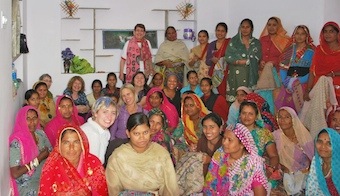
Anchal: The circle of women
By TIna Romenesko
Today is a day that all of us have been looking forward to since signing up for this Indian adventure. As we enter the Vatsalya building, we are again greeted by the lovely Jaimala. Today is a workshop day, so the women are sitting on the floor, sewing, measuring, and marking fabrics with Executive Director Colleen Cline.
Our formal introduction to the project is an informational meeting run by Jaimala and Colleen. Their gratitude to Dining For Women is palpable. Our grant was received at a critical point. Colleen had just been diagnosed with Hodgkins disease, funds were low, and it looked like her dream would have to be tabled for an unknown amount of time. Enter DFW! The program has been able to add over 30 women to the original 14, plus more that will be trained beginning today. The procurement of Urban Outfitters (UO) as an outlet for their wares, with Colleen and staff at the designing helm, is a marvelous combination. Today they will be working on a vest and a bag for UO. Colleen will be working with some of the more advanced seamstresses this week, teaching them the art of design and color composition.
The road has been long and filled with many challenges. The women here are all involved with the commercial sex trade. Ajmer is a hot spot for the industry, with a recognized belt of sex workers that serve the community and also truck drivers that are often on the road for months at a time. Anchal, in partnership with Vatsalya, offer these women a change of lifestyle, health advice, and access to local clinics. Often 150 women show up for an informational meeting. A small percentage of them will actually participate, learn the new trade of sewing kantha quilts, and work toward improving their status and changing their own lives and the lives of their children.
The Anchal space is airy and inviting. The women sit together, working on projects, talking, laughing, and sewing. A kantha quilt has 4-6 layers of recycled saris, that are hand quilted with a variety of stitches – that become an intricate part of the design. A big part of the work is finding, washing, and sorting. Since bringing UO on board, the quality and specificity of the work has become more stringent. It’s critical that Colleen is clear and has project leaders that understand market standards.
For the next hour, we disperse into the group, sitting on the floor in the workrooms, pantomiming, listening, and observing. Susan Ackland asks about the relationship of 3 women in her group. She gestures and asks “Auntie?” to which they all dissolve in laughter, sharing high fives. “Sisters”, they reply. Another group of women point to Taryn Walker’s eyebrows and say “new design?”. They had also been part of the Anchal partnership in Jaipur the previous day. She motions tweezing and they all make startled faces that grow larger as she suggests the rip of waxing! Threading is the preferred method of hair removal in India. Women’s beauty issues in pantomime. Love it.
In contrast with the Muslim group we visited yesterday, that really needed the money to provide stability for their families, these women already have money – quick money – as street workers. Their choice to make a change is driven more by status than by income. By changing their profession, they change the stigma of their children. Anchal offers them a totally different lifestyle, that is not immediate, but is long lasting. Many of the women still work in the sex trade, but are seeing fewer and fewer clients. Some are home based. Others are brothel based. They are competitors on the street and friends, for the most part, in their Anchal home. Not that there aren’t problems, muses Jaimala. Some women demand more and want to work less. Those issues are met head on – immediately. The structure of Anchal is clear. They either choose to be part of it, or not.
After lunch, we form a circle and 5 of the women sit with us to talk freely about how their individual lives have changed since embracing Anchal. Jaimala interprets. “We were helpless before, and now we make our own decisions,” says the group leader. We all burst into applause! One of the women’s daughters is now doing post-graduate work and her granddaughters are in private school – which wouldn’t have been possible, if her mother was still in the sex trade business. Again – its a matter of stigma, not cash. If your mother is a sex worker, your status is lower than low – and your chances of being accepted into a good school are almost nil. One woman shared that she was orphaned at 11 and married shorty afterward to a man 16 years her senior. She’s now the outreach project manager and has a good eye for women in need that want to make a change. Another woman with two young children shares that her husband is an alcoholic and used to bring clients to her (home based prostitution). Jaimala shares that she has had to be very strong to break that pattern of abuse.
As we head upstairs to take a group photo, the energy is lively and playful. We hug and smile and joke and smile some more. Many of us have bought quilts and scarves. Each is signed by the artisan, written in Hindi. We search for each of them and take our pictures – together. An Anchal first! The women are very proud, holding their wares with bright smiles.
Way to go, Dining For Women! Your support has changed the lives of these women forever. It’s an amazing opportunity for us to feel the widening circle of our individual impact at monthly meetings.
